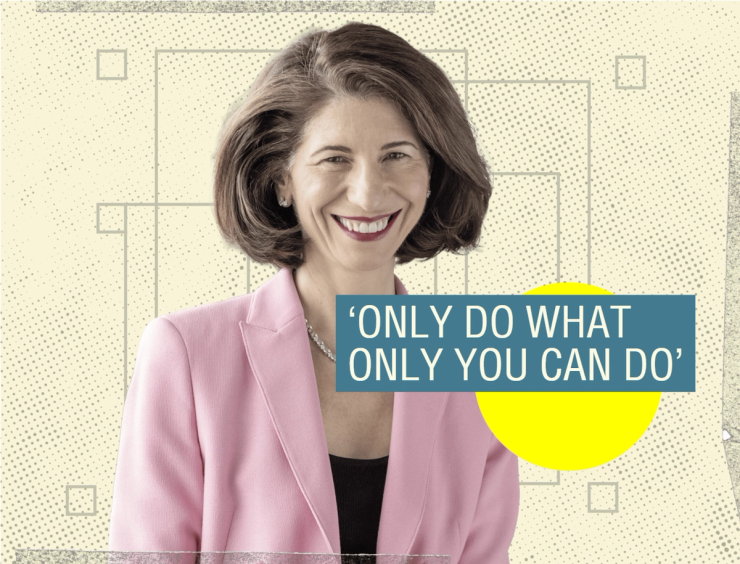The Signal Interview
“Travel is not like buying a T-shirt,” Ariane Gorin says to explain why she doesn’t see AI agents replacing online travel groups like Expedia, the $27 billion business she has run since May last year. Travelers commit precious time and money when they book a trip, so they’ll always want a partner who can help if something goes wrong, she believes.
“There’s always some small part of the market that may get completely replaced, but in my mind, [agents] are going to augment. Ultimately, travelers are looking for a trusted place or a trusted partner for their travel,” she says.
The BCG-trained former Microsoft executive is not in denial: If Expedia did nothing to respond, AI would be “very disruptive,” she acknowledges. The advent of AI is “almost a third chapter for the company” — akin to its launch in 1996 in the early days of e-commerce, or its adaptation to mobile screens in the early 2010s.
There are many questions the company cannot yet answer, including how long most users will still be coming directly to its app or website, rather than starting their travel search in an AI chatbot, she admits. So “we have to innovate, we have to test, we have to try a lot of things, and we’ll learn every step of the way,” she says.
So far, investors have been inclined to believe Gorin’s assurance that Expedia can do more than just weather the disruption. Its stock is up almost 30% in the past year, beating the wider US market.
On Thursday afternoon, she announced guidance-beating, third-quarter results that sent its stock jumping further after the bell. Expedia lifted its forecast for full-year revenue growth sharply, thanks in part to 26% quarterly growth in the business-to-business travel division that Gorin ran before becoming CEO.
“It gives me and the team confidence in our ability to execute,” she told Semafor on Thursday, pointing to the results as “proof points” of progress on a strategy that depends on harnessing AI rather than being upended by it.
Building a framework for AI implementation
How does a company founded almost 30 years ago, in an earlier era of technology, master the demands of this one? “My answer to everything is always being structured and disciplined,” Gorin replies. “I believe this is uniquely the job of the CEO, to step back and say, ‘OK, how are we going to look at this?”
When she did that last year, she concluded that Expedia needed to answer four questions about AI: How would it change travelers’ experience of her company’s products? How would the shift from search engines to AI interfaces change how people encounter its brands? What partnerships would Expedia need? And how should it use AI tools internally?
That exercise, she says, provided a framework for planning the investments and organizational changes needed to make customers’ experience of the group’s brands — Hotels.com, VRBO, and Expedia itself — “the best it can be.”
Gorin has another motto: “Only do what only you can do.” It started as a personal mantra 15 or 20 years ago, as she juggled work and family commitments. (“Only I can go to the concert for my son and really enjoy it,” she says as an example.) It evolved into a business principle when she was running Expedia’s B2B division, where she realized her company could play to partners’ strengths rather than trying to build everything itself.
It was an equally useful message to partners in further-flung corners of the world: that they could refer business to Expedia, rather than trying to compete in its home market. And it echoes her response to reports last year that Uber had explored a bid for Expedia. No such offer made its way to her desk, she says, and “my mantra to the teams [was], ‘Let’s worry about the things that are in our control and not worry about the things that are out of our control.’”
Her broader message of focus forces a business to ask “what are the things that are going to uniquely make us different,” Gorin notes, and to resist the temptation to try to do everything. “There are a lot of things that we should just partner with,” she says.
Last month, Expedia struck one such partnership with ChatGPT, embedding a version of its app inside OpenAI’s chatbot to allow users outside the EU to ask conversational travel-related questions and quickly receive dynamic prices, interactive maps, and personalized recommendations.
Don’t spend forever evaluating
Expedia takes pride in being a data-driven company, and Gorin sees the decades of data it has on travelers’ behavior as an asset in the AI wars. She talks of Expedia’s belief in the power of technology to create better experiences as one of its strong points, but cautions that corporate culture sometimes needs “to shift a little bit when the company evolves.”
The flip side of Expedia’s data-driven ethos is that “sometimes, when things are moving fast, that can slow you down,” she warns, recalling a recent conversation with a colleague who was weighing the capabilities of potential technology partners.
“I said, ‘How long [will] it take us to evaluate the different technologies? Because if it’s going to take us longer than it would for one of these providers to evolve their road map, it’s like you’re assessing a set of capabilities… that are going to be totally different in three months,’” Gorin observes. The better approach, she told her colleague, would be to choose which partner Expedia most wants to work with and believes can adapt to meet its needs.
CEOs must “lead from the top” on AI, she says, encouraging their teams to make faster decisions. The question facing a leader in her position right now is, “How do you help people make even more bets and be ready to fail? Because when you see the speed of innovation, it’s mind-blowing,” she says.
If executives are not clear with their teams about the need to work differently in this new era, the changes they want to see will not happen, she says. “A company will go on a certain path, and things will happen in a certain way. And you really need to insert yourself when there’s a change you want to make happen. I think AI is a great example of that.”
Strategy and storytelling on a diet of ‘Dogfood’
When Gorin became CEO, her B2B business was growing well, but the consumer business was less healthy after a technology overhaul, changes to its loyalty programs, and a post-pandemic pullback from some international markets.
The differentiation between Expedia’s three brands had become insufficiently clear, she felt, so she put new executives in charge of each of them, and sought out to feedback from their customers. Many frequent users of Hotels.com, for example, preferred its old loyalty program to the one that Expedia rolled out across all three brands. The challenge has been to ensure that the parent company has centralized capabilities that can scale, but that it is also tuning them to each brand.
Beyond changing her top team and fine-tuning her products, Gorin has been keen to project broader cultural messages since taking the helm. In her first town hall meeting, she told employees that she expects all of them to use Expedia’s apps when they travel. Those who spot bugs in its technology can report them to its product teams through a program called Dogfood, and earn travel vouchers as a reward.
Gorin, who is on the road about half the year and books all of her own hotels, counts herself as a Dogfood “super user.”
CEO “storytelling” is important, she says, recalling something else she shared in that first meeting. Her eldest sister was diagnosed with lung cancer in 2016, and Expedia allowed Gorin to fly from London to Texas regularly, to be with her through treatment and then hospice care in the final year of her life.
“One of her pieces of advice to me was, ‘Ariane, travel more, because more travel equals more memories,’” Gorin recalls. “And I thought: ‘That is what we do as a company.’”
Whatever more she needs to do on artificial intelligence, Expedia’s ultimate purpose is to help people make memories and connections in the real world, she reflects. Connecting her employees to that mission, she says, “is probably the single most powerful thing I can do.”
Notable
- ChatGPT’s new app integrations with Expedia and Booking.com are a step toward turning it from a chatbot into a fully-fledged digital assistant and could help OpenAI further erode Google’s search dominance, eMarketer’s Rachel Wolff writes. Almost 3 in 10 US consumers already use AI services to plan trips, according to Adobe.
- Expense platform Navan found a 20% increase in business travel during Q3 of this year, according to its Business Travel Index.


